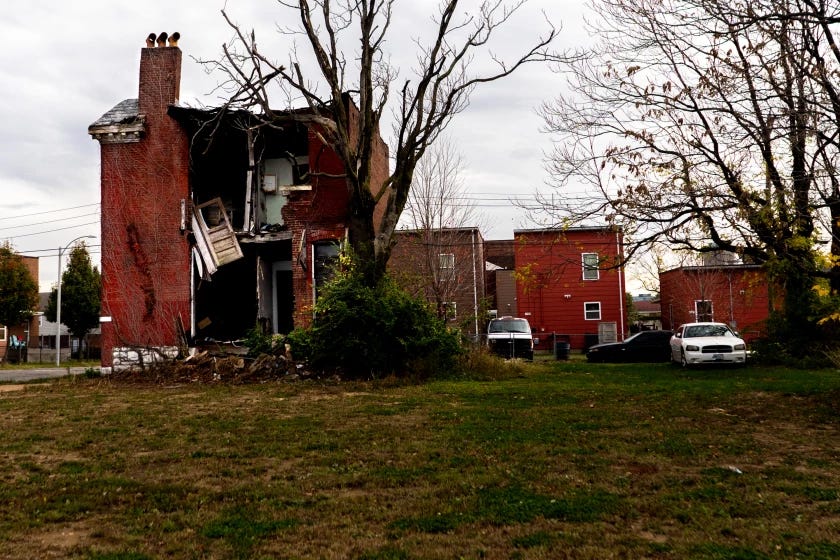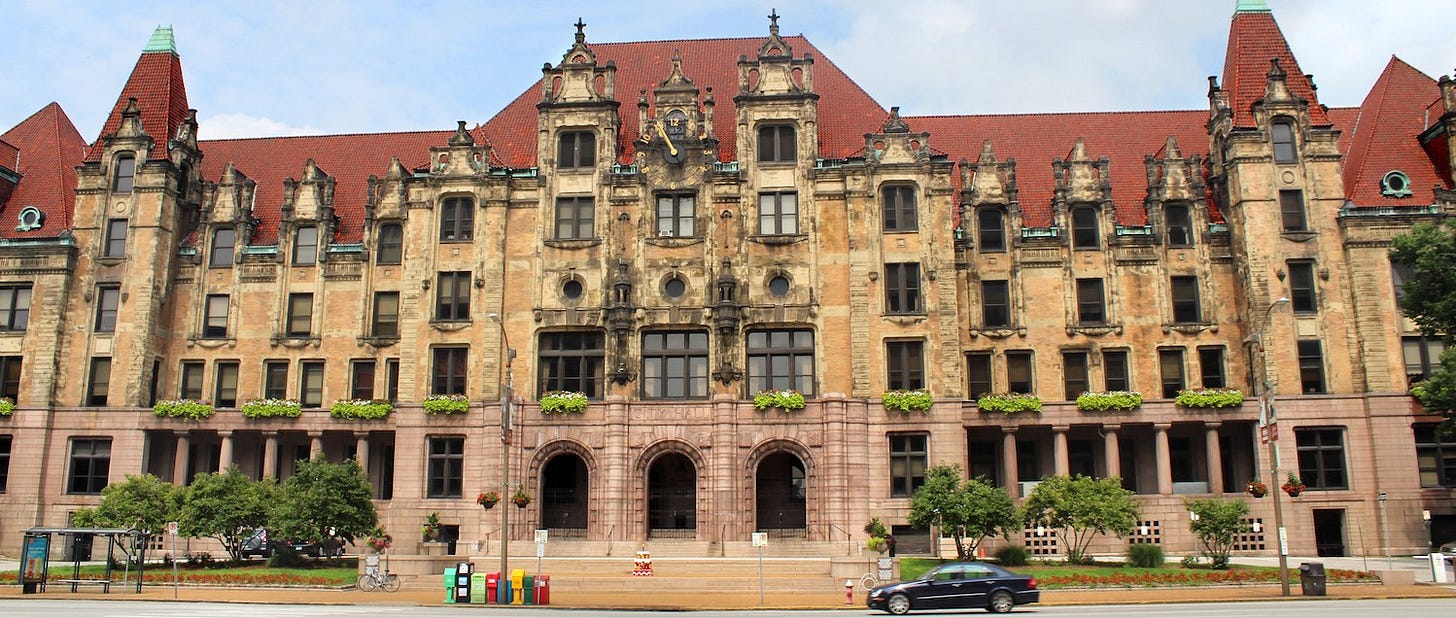St. Louis Observer: November 18, 2022
Police bill of rights legal challenge dismissed; County judge denies motion to vacate death sentence; two transitional housing apartment buildings open; KC calls for return to local control
Editor’s Note
This weekend, the Observer is giving thanks and expressing our gratitude for all of our readers. We have some exciting things coming in 2023, and we’re glad to have y’all with us in the fight for abolition.
We’ll be skipping next week’s edition but we’ll be back on Friday, December 2! Over the holiday, we will be reading Ken Ellingwood’s “First to Fall,” a 2021 biography of Elijah Lovejoy, the original founder of the St. Louis Observer.

Police, prosecutorial, and judicial accountability
An appointed special prosecutor has alleged racial bias in a 53-page motion asking to set aside the conviction and death sentence of Kevin Johnson, a Meecham Park man who was accused to killing a Kirkwood police officer. E.E. Keenan, a Kansas City-based attorney, found that former prosecuting attorney Bob McCulloch made intentional efforts to strike Black jurors from the pool in Johnson’s case, along with other conclusions of McCulloch’s racist treatment of Black defendants compared to white defendants. St. Louis County judge Mary Ott already has denied the special prosecutor’s motion; he is expected to appeal. [Monica Obradovic/Riverfront Times]
Following the passage of Amendment 4 in Missouri, which forces Kansas City to raise its annual police budget to 25%, activists now call to end state control of KCPD. “There is no reason that we still live under this colonial system,” Kansas City Mayor Quinton Lucas told KCUR. “It was wrong, in my opinion, when it was first created, and it's certainly wrong all these decades later.” [Celisa Calacal/KCUR]
A Cole County judge has dismissed St. Louis City’s legal challenge to police “bill of rights,” passed by the Missouri Legislature in 2021 and awarding police elevated labor and civil rights protections. St. Louis City argued that the bill created two classes of public safety employees and created an unfunded mandate for cities to follow. [Rebecca Rivas/Missouri Independent]
Economic development and housing
Doorways St. Louis opened its first 50-unit apartment building in the Jeff-Vander-Lou neighborhood, and St. Patrick Center opened its 24-unit building in the Greater Ville, with both projects including space for intake services and programming for residents. Another 39-unit apartment building is in the process of development, but advocates warn that the City needs much more housing for those without shelter, especially as dangerous temperatures have already arrived in the area. [Jeremy D. Goodwin/St. Louis Public Radio]
Black women in St. Louis County experienced the highest risk for employment loss and food & housing instability during the pandemic, as determined by a recent CDC study. Links have been made between employment loss or job insecurity and adverse health outcomes, such as an increased risk of substance abuse, suicide, depression, anxiety, poor physical health, and development of chronic diseases. [Staff/St. Louis American]
Despite tens of thousands of vacant lots in Kansas City and St. Louis, urban farmers are struggling to acquire tracts of land to provide stability and increased food security. Advocates have cited to complicated landbank rules, local bureaucracies with poor communication, and the prioritization of commercial development over sustainable farming. [Eva Tesfaye/Harvest Public Media]
St. Louis neighborhood groups and associations have increased their use of state laws either to force derelict propertyowners to fix up abandoned houses or to obtain the blighted properties to fix up themselves. Assisted by Legal Services of Eastern Missouri, about 20 north and southside neighhorbod associations are working to compel propertyowners to remediate vacant and nuisance properties. [Chad Davis/St. Louis Public Radio]
Further reading
An outlying 2021 law in Missouri that circumvents federal laws related to certifying “sheltered workshops” (employment programs for adults with disabilities where private employers are permitted to pay sub-minimum wage) has been found to have allowed for some disabled workers to earn less than $1 per hour. An investigation by The Kansas City Beacon and ProPublica found that the majority of 5,000+ disabled adults employed by Missouri’s 97 sheltered workshops have worked at these locations for at least a decade, indicating that very few employees “graduate” as intended by the program, and that the workshops focus on maintaining the employees instead of transitioning into the regular workforce. [Madison Hopkins/ProPublica]
Bomb threats made to dozens of HBCUs in January and February of this year have been traced by the FBI to a single juvenile suspect, with no other details provided. More than 30 threats were made and the FBI has affirmatively acknowledged the racist intent to inflict harm to the Black community. The FBI is still investing a series of unrelated threats in February and March that appear to originate from overseas. [Adriana Figueroa/Missouri Independent]
The state of Missouri has banned more than 300 books since a new law took effect in August. “Explicit” materials banned in schools includes adaptations of the Gettysburg Address, works by Mark Twai & William Shakespeare, and the comics Maus and Batman. SB 775 makes a Class A misdemeanor the provision of “explicit sexual material” to students, with up to one year of incarceration and a $2,000 fine. [Monica Obradovic/Riverfront Times]
Beyond the Paywall
To read the below articles in full, please visit SLPL.org and access these articles through the Digital Content tab. St. Louis City & County residents can read these publications free using their library cards.
“Parson urged to cancel execution of man who killed Kirkwood police office,” by Kurt Erickson, St. Louis Post-Dispatch
“As cold weather hits, advocates say St. Louis is late to fund emergency shelters,” by Nassim Benchaabane, St. Louis Post-Dispatch
“Man says he was wrongly jailed for months. St. Louis officials aim to dismiss his suit,” by Erin Heffernan, St. Louis Post-Dispatch
“Settlement checks are in the mail to thousands of Missouri prison workers,” by Kurt Erickson, St. Louis Post-Dispatch
“Messenger: Voters reject fear-mongering. Why? Crime is down in St. Louis, other cities,“ by Tony Messenger, St. Louis Post-Dispatch
“Four years after riot, Missouri moving inmates back into prison,” by Kurt Erickson, St. Louis Post-Dispatch
“Attorneys, law enforcement ensure how recreational marijuana will affect Missouri policing,” by Dana Rieck, St. Louis Post-Dispatch
“Legal pot raises questions about the future of workplace drug policies in Missouri,” by Annika Merrilees, St. Louis Post-Dispatch
Legislative Update
St. Louis City Board of Aldermen
BB 116, sponsored by Ald. Shameem Clark Hubbard (Ward 26), would delegate a portion of the City’s remaining ARPA funds to create a universal basic income pilot program. The bill will be considered by the HUDZ Committee on December 1 at 9:00 a.m.
BB 87, sponsored by Ald. Pamela Boyd (Ward 27) and Ald. Carol Howard (Ward 14), would add a new police district to cover Lambert International Airport, raising the number to 7 total in the City of St. Louis. The bill was assigned to the Public Safety Committee on September 16 and has had no further movement.
Learn more about how a bill becomes a City ordinance.
Track these board bills and much more on St. Louis PoliticClips’ newly-updated dashboard.
Quote of the Week
…I feel like when alderpeople have questions, it’s suddenly seen as this traitorous act to have a question or to ask the questions that our constituents are asking for us to ask…
Alderwoman Anne Schweitzer (Ward 13) during debate on Resolution 110, which would provide a tax abatement to a water park project located in a floodplain



